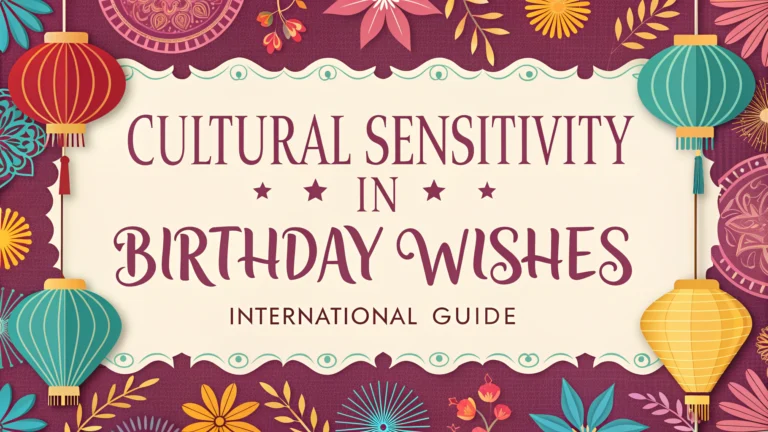Understanding cultural sensitivity when wishing someone a happy birthday can strengthen relationships and show genuine respect for diverse traditions.
Different cultures celebrate birthdays in unique ways, and being aware of these differences helps avoid unintentional offense.
Key Cultural Considerations
- Some cultures don’t traditionally celebrate birthdays
- Certain numbers carry specific meanings in different cultures
- Gift-giving customs vary significantly worldwide
- Religious beliefs may affect celebration practices
Cultural Guidelines by Region
| Region | Birthday Customs | What to Avoid |
|---|---|---|
| East Asia | Red envelopes with money are common gifts | Avoid number 4 in Chinese culture |
| Middle East | Group celebrations preferred | Avoid alcohol-related wishes |
| South Asia | Religious blessings are important | Don’t give leather items to Hindus |
| Europe | Individual celebrations common | Timing of wishes varies by country |
Religious Considerations
- Jehovah’s Witnesses don’t celebrate birthdays
- Some Buddhist traditions focus on collective age celebrations
- Islamic customs vary by region and interpretation
- Jewish birthdays follow the Hebrew calendar
Safe Universal Approaches
A simple “Thinking of you on your special day” works across most cultures.
When unsure, ask colleagues or friends from that culture for guidance.
Focus on personal growth and well-being rather than the celebration itself.
Digital Communication Tips
- Use culturally neutral emojis
- Avoid religious symbols unless certain of appropriateness
- Consider time zones when sending wishes
- Remember some cultures use different calendars
Professional Settings
Keep workplace birthday wishes simple and culturally inclusive.
Check company policy regarding birthday celebrations.
Language Considerations
- Research traditional birthday greetings in the recipient’s language
- Verify translations with native speakers when possible
- Consider formal vs informal language based on relationship
Document and share successful approaches within your organization or social circle to build cultural competence.
Regular updates to cultural knowledge help maintain respectful and meaningful birthday communications.
Building Cultural Competence
- Attend cultural awareness workshops
- Read about different cultural celebrations
- Develop relationships with people from diverse backgrounds
- Keep a cultural calendar for reference
Common Mistakes to Avoid
- Assuming everyone celebrates birthdays
- Using inappropriate humor or jokes
- Forcing participation in celebrations
- Overlooking cultural dietary restrictions for cakes or treats
Alternative Recognition Options
- Achievement celebrations
- Work anniversaries
- Team appreciation days
- Personal milestones
Future Trends
Digital platforms are developing more culturally inclusive features for celebrations.
Organizations are creating more flexible celebration policies.
Conclusion
Cultural sensitivity in birthday wishes requires ongoing learning and adaptation. Success comes from combining awareness, respect, and thoughtful communication.
Key takeaways:
- Research before sending wishes
- Respect cultural and religious differences
- Maintain flexibility in approach
- Keep learning and updating practices
Remember that cultural competence is an ongoing journey, not a destination.
FAQs
- How do birthday celebrations differ across cultures, and why should I be mindful of this?
Birthday celebrations vary significantly across cultures – some don’t celebrate birthdays at all (like Jehovah’s Witnesses), some consider certain birthdays unlucky (like 4 in East Asian cultures), while others have specific milestone celebrations (like Quinceañera in Latin cultures). - Are there any cultures where wishing “Happy Birthday” might be inappropriate?
Yes, in some Buddhist traditions, particularly in Southeast Asia, birthdays aren’t traditionally celebrated. In some Middle Eastern cultures, birthday celebrations are seen as a Western practice and might not be customary. - What colors should I avoid using in birthday cards for international recipients?
Avoid white in many Asian cultures (associated with death), red ink in South Korea (traditionally used to write names of deceased), and black in many Western cultures (symbolizes mourning). - How do religious beliefs impact birthday greetings and celebrations?
Some religious groups like Orthodox Jews traditionally don’t celebrate birthdays. Muslims may avoid birthday celebrations as they’re not part of Islamic tradition. Some Christians might prefer focusing on name days rather than birthdays. - What are appropriate times to send birthday wishes in different cultures?
In many European countries, it’s considered bad luck to wish someone happy birthday before their actual birthday. In some Asian cultures, early morning wishes are considered most auspicious. - Should I include religious references in international birthday wishes?
Unless you’re certain of the recipient’s religious beliefs and practices, it’s best to avoid religious references in birthday wishes to prevent any unintended offense or discomfort. - What gift-giving customs should I be aware of when sending international birthday wishes?
Certain numbers of gifts are considered unlucky in some cultures (4 in East Asia), while some cultures may find certain gifts inappropriate (alcohol in Muslim countries, clocks in Chinese culture). - How do age-related birthday greetings differ across cultures?
In East Asian cultures, people are considered 1 year old at birth. Some cultures celebrate specific milestone birthdays differently (60th birthday is especially important in Korean culture, sweet 16 in America). - What are some universally acceptable birthday greeting phrases?
Simple wishes like “Best wishes on your birthday” or “Wishing you a wonderful day” are generally acceptable across cultures. Avoid humor or puns that might not translate well. - How should I handle birthday wishes in professional international business relationships?
Keep professional birthday wishes formal and brief. In some cultures like Japanese, birthday wishes in business contexts should respect hierarchical relationships and maintain appropriate levels of formality.







